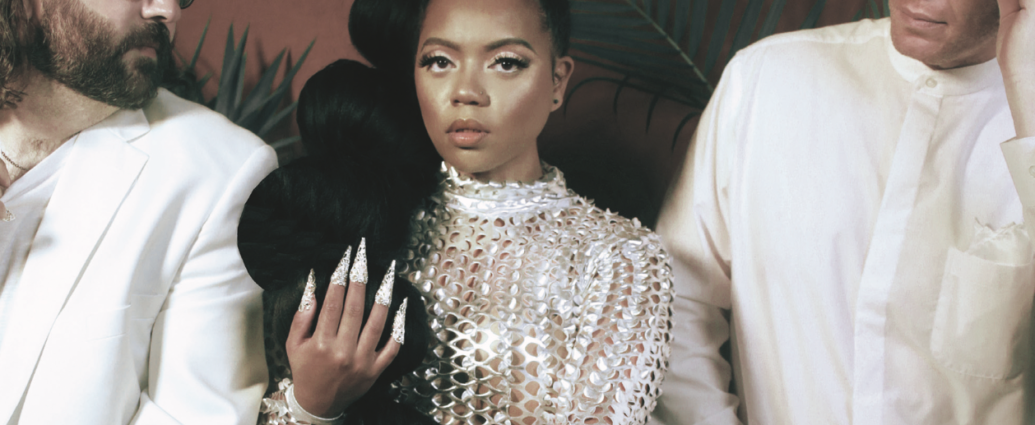By Katie Dohman
It’s 10 a.m. mountain time and frontwoman for the six-piece band Seratones, AJ Haynes, is in her hotel room in Denver, eating breakfast. She just played a fundraiser the night before as a stop on her band, the Seratones’ tour in support of their latest disco- and funk-drenched release, Love & Algorhythms.
Just a couple of years ago, the Shreveport, Louisiana–based group was touring behind Power, their third album featuring the scorcher ‘Gotta Get to Know Ya,’ when COVID hit. While on tour, Haynes was also flying coast-to-coast, playing for fundraisers for the Center for Reproductive Rights as part of her work as an abortion rights advocate. She was in Washington, D.C. the day that SCOTUS ruled on June Medical Services vs. Russo, which overturned a Louisiana law making it more difficult for physicians to perform abortion services there and directly impacted Hope Medical Center, where she worked as an abortion patient advocate.
“We won, which was incredible. It was such an intense time, but emotionally enriching too, because I spent so much time with my abortion family… even as an artist, I feel like those are the people who understand me more than anyone. Because we’re filling a need, we are speculative fiction, we are world-building in real time. Which is scary.”
“Power, for me, was written with shit already having hit the fan because of my lived reality,” she continues. “I have been very aware of these inequities. Sitting at the intersection of this many vulnerabilities is terrifying AND it’s the place of visionaries, because we can see the kaleidoscopic view of the world and who is impacted by what, having a historical understanding of why we’re here and where we are. The answer to that is: Colonialism and delusion of white supremacy has brought us here. . . On Power, I’m saying we have the power, this is real, we’re caught in interconnected destinies and yet we’re being made to feel as if we’re divided by a handful of folks. Just because they’re loud, doesn’t mean they’re right.”
Between Power stops, she was listening to Parable of the Sower by Octavia Butler on audiobook—and then the cruise ship full of COVID-positive people arrived on the shores of California. Shit had gotten real. It was time to go home.
For Haynes, home meant a return to her position at Hope, the only abortion clinic in Louisiana. “This is how I made it: I would get home from the clinic and since we didn’t know how everything worked with COVID, I would take a shower to reset and clean everything off. How fucking traumatic, you know? I would go straight to gardening, turn on Donna Summer and blast ‘I Feel Love’ multiple times. I would garden, you know, because I needed to know something, to shape something with my hand, so something can grow.”
Eventually, though, she was dangerously crispy from burnout, and left the clinic. She immersed herself in Afro-Science Fiction and Black speculative fiction, reading authors such as N.K. Jemison. She started communing with her plants, asking them what she needed to know. She nurtured her relationship with her partner. Haynes is the kind of person who feels the entirety of the cosmos in everything she does. Ask her about her role in social justice work, and she’ll deliver an enchanting 20-minute rundown of the largely forgotten role of a mythological Greek figure who helped restore the spirit of the grieving goddess in charge of feeding the community.
She was made the first Black president of the New Orleans Abortion Fund, which provides financial assistance and resources to people seeking abortion care. And the music started to come, too. “We the people are absolutely holding on by a thread. That’s the reality. This is what warfare looks like. I say that with my full chest . . . My work as president is very similar to my creative work: These are the resources we have. This is the stark, fucked-up reality. How do we continue to walk in purpose amid this?”
“Everything informs each other,” she says. “I had to create to get through this. Music and the creative process is medicine because it holds me accountable for processing. I have to process what’s going on through art, because it’s my job and purpose and life. Even if I wasn’t making money off it, even if I didn’t have the resources I have now it would be DIY or Die. I need to express what’s happening, because someone else needs to hear it too.”
What resulted was Love & Algorhythms, an album touted as “the vast fullness of human experience and the irresistible potential of liberation,” which aurally sounds like a multi-layered, very sexy disco-soul dance party, underscored by messages of empowerment and powerful critiques of the system, led by Haynes’ church-raised power belt. Definitely part Donna Summer, but threads of Janelle Monae, Sharon Jones, Prince, and Blondie surface.
Despite the oppressiveness it came out of…the album largely sounds like love and joy. “Grief and joy [exist] at the same time. They’re intertwined. The more you love someone, the more vulnerable you are. And it’s worth it,” she says. “That joy is necessary, and an act of resistance, sure, but it just is. Are you going to choose to feed it? What you pay attention to grows. Joy is here as much as suffering. I’ve been taught to pay attention to it by the beautiful matriarchy I grew up in: We always had joy, we always counted on joy. What will you lose with some laughter? Nothing, and you might gain something too, which is pretty sweet. The verb of love, not just the coincidence of it, is a choice.”
The choice, readers, is August 24: Tickets to the Turf Club show where the Seratones will celebrate that very specific intertwining of struggle and joy, oppression and love. “People just show up ready to dance, ready to get in their bodies, because if we’re not going to have a revolution that centers pleasure and joy, then what’s the point?”
WHEN YOU GO
Seratones w/Jackie Kean
August 24
8 PM, $16-$18
Turf Club, 1601 University Ave., St. Paul


Comments are closed, but trackbacks and pingbacks are open.